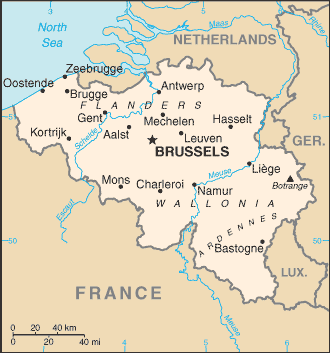Belgium
The Kingdom of Belgium (French: Royaume de Belgique, Flemish: Koninkrijk België, German: Königreich Belgien) is a country in Western Europe, bordered by the Netherlands, Germany, Luxembourg, France, and the North Sea. Geographically and culturally, Belgium is at the crossroads of Europe, and during the past 2,000 years has witnessed a constant ebb and flow of different races and cultures. Consequently, Belgium is one of Europe's true melting pots with Celtic, Roman, and Germanic cultures having made an imprint, and later on in history, French, Dutch, Spanish, and Austrian influences. During most of its history, Belgium has been part of the Low Countries, also designated as the Netherlands. The earliest named inhabitants of Belgium were the Belgae. They were (mostly) Celtic tribes, living in northern Gaul. In 54 BC, they were overcome by Julius Caesar, as described in his chronicle De Bello Gallico. The Franks finally installed a new kingdom under the rulers of the Merovingian Dynasty. Christian scholars, mostly Irish monks, preached Christianity and started conversion work under the pagan invaders. The Merovingians were rather short-lived, as the Carolingian Dynasty soon took over. After Charles Martel countered the Moorish invasion from Spain (732 - Poitiers), the famous king Charlemagne brought a huge part of Europe under his rule and was crowned as the "Emperor of the Holy Roman Empire" by the pope (800). In the 17th century followed Austrian rule, and a few years of French rule under Napoleon. After Napoleon's demise, in 1815, Belgium was reunited with the northern provinces in the United Kingdom of the Netherlands until the Belgian Revolution in 1830, which established an independent Belgian state. The Belgian revolution was initiated by the French-speaking minority who controlled the factories and other economical resources and who didn't want to live under a Dutch-speaking administration. The Belgian King, Leopold I, was chosen with the assistance of the British. The country's neutrality was guaranteed against future foreign military aggression. This neutrality was violated in 1914 when Germany invaded Belgium as part of the Schlieffen Plan. The British decision to honour their treaty obligations, as much as the entente cordiale with France, forced them into the First World War. After a period of alliance with France after the First World War, Belgium tried to return to neutrality in the 1930s, but was once again invaded by Germany in 1940. After World War II, the policy of neutrality was abandoned, and Belgium joined NATO. It was also one of the founding members of the European Economic Community. Belgium possessed one primary foreign colony during its history: the Congo, which was given to King Leopold II in the Conference of Berlin in 1885. He made the land his private property and called it the 'Congo Free State'. In this Free State, the local population was brutalised in exchange for rubber, a growing market with the development of rubber tyres. In 1908, the international pressure against the cruelties of King Leopold II (estimates about the number of deaths range from 3 million to 22 million people, 8 million to 10 million being the estimates most often cited) became so great that he was forced to sell his property to the Belgian state as a colony for 150m Belgian francs. From then on, it became Belgian Congo, before gaining independence from Belgium in 1960. Belgium's foreign involvement increased after the World War I when two former German colonies, Rwanda and Burundi, were mandated to Belgium by the League of Nations. Belgian policy in the administration and sociocultural development of these countries has been heavily criticised, many seeing Belgian decisions as contributing significantly to the troubles in Rwanda in the 1990s when a genocide took place, with an estimated 1 million casualties. Since the 20th century, the history of Belgium became more and more dominated by the increasing autonomy of its two main communities, the Dutch- and the French-speakers. As an indication of this, since around 1970, there are no significant national Belgian political parties anymore, but only Flemish- or French-speaking parties (and one German-speaking party). The regular attempts to re-establish national, Belgian parties end up below 1 percent of the electorate; the Brussels parties either never got started (as with the 'Blauwe Leeuwen' and 'Rode Leeuwen' for the Flemings in Brussels), or got merged into one of the French-speaking liberal parties (such as the French-speaking FDF, which, however, has had a significant influence for years, and still keeps some independence). As such, the political landscape shows a near-perfect dual political system, reflecting the two underlying dominant communities. Several people observe that Belgium is well on its way to disintegration, falling apart into two independent states, Flanders and Wallonia. Some even believe this would have already happened if it wasn't for the problem that the city of Brussels poses.
This article is licensed under the GNU Free Documentation License. It uses material from the Wikipedia article "Belgium". |
||||||||||

